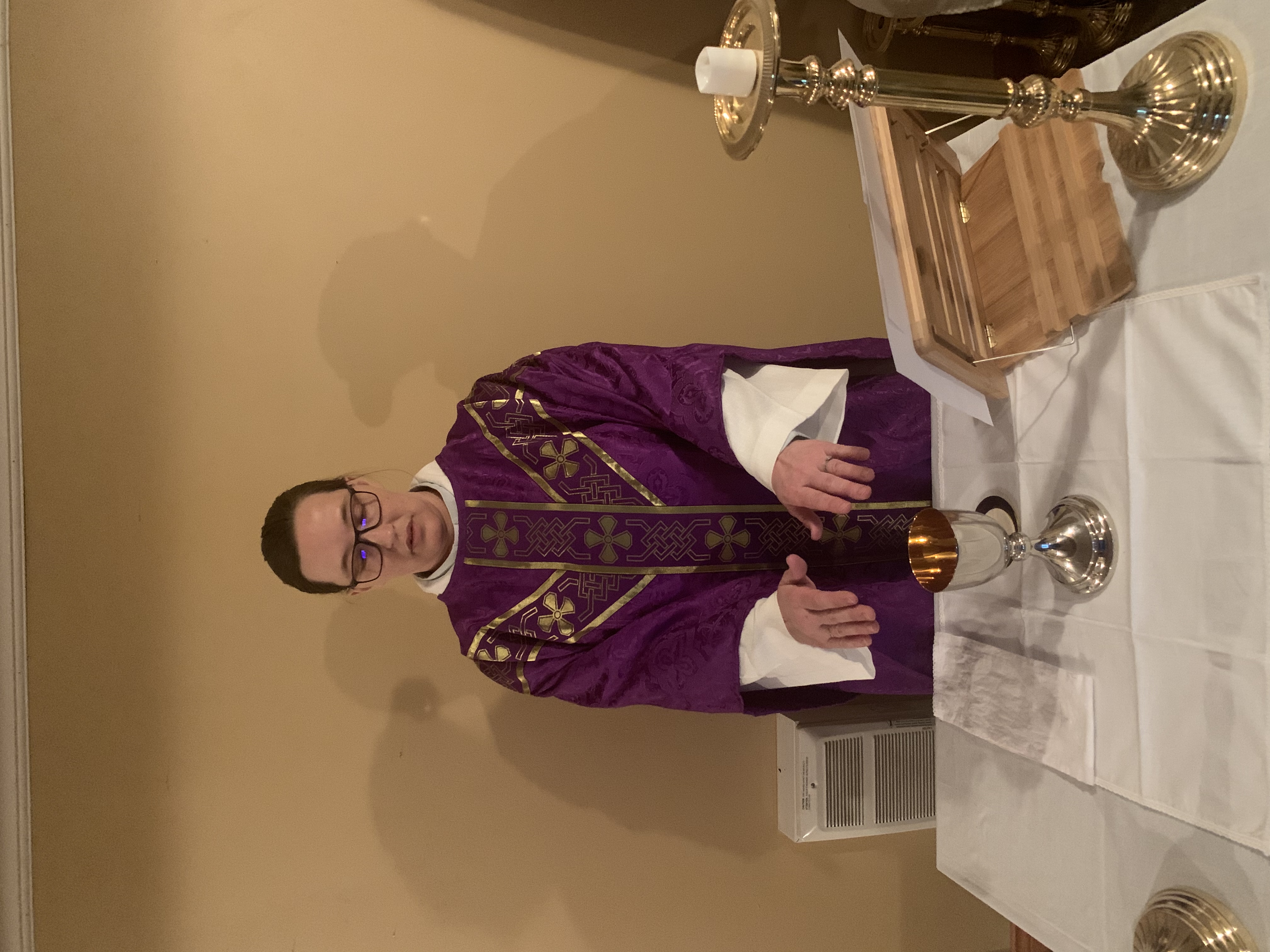- Home
- simply catholic
- Catholic Contentions
- Call for Harm to Enemies and Heathens
Simply Catholic and Welcoming You
Why do catholic prayers or scriptures still call for harm to enemies and heathens?

A Simple Altar Prepared for Catholic Mass - Itself a Celebration of Love, Sacrifice and Forgiveness
While Catholic scriptures and prayers do contain passages that might appear to call for harm to enemies and heathens, particularly in the Old Testament, the Church interprets these passages within the context of their historical and cultural setting. The Old Testament was written by and for the Jews who were a persecuted, often enslaved people who had valid reasons to fear the loss of their nation and their faith.
The church emphasizes the New Testament call to love and forgiveness, even towards enemies. The Church teaches that hatred of the evil act is distinct from hatred of the person committing the act.
Old Testament Context:
Some Old Testament texts, like certain Psalms, contain imprecatory language, calling for or espousing divine judgment and even destruction upon enemies. These passages reflect the historical context of ancient Israel, where warfare and conflict were common, and enemies were often seen as threats to the nation and its faith.
New Testament Emphasis on Love:
The New Testament, particularly the teachings of Jesus, emphasizes a radical love and forgiveness that extends to enemies. Jesus commands his followers to "love your enemies, do good to those who hate you, bless those who curse you, pray for those who mistreat you". Luke 6:27-28 and Matthew 5:44
Interpreting Imprecatory Psalms:
The mainstream Catholic Churches do not interpret these Old Testament passages as literal calls for violence. Instead, they are understood as expressions of righteous anger against injustice and sin, and as a reflection of God's ultimate judgment. The Church emphasizes that God's justice ultimately prevails, and that individuals should not seek personal vengeance but rather trust in God's justice.
Distinction between Person and Action:
The Church distinguishes between hatred of the evil action and hatred of the person committing the action. While one can and should hate the sin or the injustice, one cannot hate the person who commits the sin. Some religious texts teach that prayers should be offered for enemies, seeking their conversion and healing.
Praying for Enemies:
Praying for enemies, even those who have wronged us, is a central practice in Catholicism. Catholics suggest this prayer is not about condoning their actions but about seeking their good and recognizing their humanity. Saying it opens our hearts to forgiveness and reconciliation and can lead to healing and positive change, for ourselves and for the person we are praying for.
Some Christians testify to the transformative power of praying for enemies, finding that it can lead to forgiveness, reconciliation, and even friendship.
While some scriptures may contain harsh language towards enemies, the Catholic Churches emphasize the New Testament call to love and forgiveness, urging believers to pray for their enemies, seeking their good and trusting in God's justice.
St Brigit’s Community Catholic Church Stance on prayers or scriptures that still call for harm to enemies and heathens

Monsignor (Now Bishop) Charlene Bradley Confecting the Holy Eucharist as She Celebrates Mass. At every Mass we say the Our Father as Taught to us by Christ Himself, including the words "forgive us our trespasses (sins) as we forgive others". Leaving no room in Catholicism for hate nor prayers for harm to others.
At St Brigit’s Community Catholic Church we understand and accept the historical standing of the old testament scriptures and the times and context in which they were written. We draw the line however at continuing to use such language in our prayers, such as the Divine office, where such references and prayers remain common even daily for some stretches of Divine Office readings.
Let me clarify, I am not referring to the readings contained in the Divine office but to the prayers therein that include the wording from some of those Psalms or readings which, thereby do or appear to espouse harm to others.
We find no justification for the continuation of such prayers instead choosing to rework these types of prayers, not the scriptures themselves, so as to reflect the message and Love of Christ. We do not see praying for the destruction of our “enemies” or the “heathens”, even if by habit or careless routine as innocent or Christian/Catholic.
Surely for prayers to be sacred utterances they must involve love, actual thought and mindfulness of our Christ centered God given Divine Commission. Thus we adapt the prayers from the Divine Office and others such that they are in keeping with the examples set and lived by Christ.
Instead of praying that God ‘destroy our enemies’, we pray He will pour His Love upon them and change their hearts and hurtful ways. Instead of praying for the ‘crushing of the heathens’ we pray He grants them the wonderful gift of faith or at least moves their hearts and minds to live to the highest possible moral and ethical standards of humanity.
Words have power. Christ said that what goes in our mouth does not defile us but what comes out of it can. We defile the sacred when we misuse it or use it for a purpose inconsistent with the Divine intention. We must do better with our prayers.
If our prayers do not fully embrace true Christian intention then they cannot be part of our worship. It is inconsistent, even counterproductive to pray for peace/love and yet use prayers calling for harm on others, regardless of their faith or lack thereof or of their harmful intent towards ourselves.
Further, about that Divine Commission to go preach to all nations, all peoples. How do you suppose an investigator of the Christian/Catholic faith will feel if they read prayers that pray harm upon their former faith or alliances? Can you see how such inconsistencies can be a real stumbling block to a sincere investigator progressing in the Catholic faith if they perceive that we preach Love and pray harm?
The words we use matter. Consistency matters. A historical record is one thing. The prayers we choose to say today are a different matter entirely. We must break this habit of melding or blurring these two very distinct expressions of our faith.
When we pray for only good for others our own hearts are changed (even if theirs aren’t). It takes two to fight. If one, ideally us, are looking truly for peace and resolution then thoughtful, meaningful prayer can effect that in our lives and our world.
Unfortunately the opposite can also be true. Thoughtless, vain repetition can plant seeds of discord in our own heads and hearts making resolution more difficult for us to see.
Before you pray, please, first pray for the presence and assistance of the Holy Spirit in your own heart, mind, body and life and for the Holy Spirit to direct your mouth that your prayers may be consistent with the intentions of Christ, the greater good of all and the furtherance of our Divine Commission.
Now, pray with real thought. Be aware of the words you use. Be actually present as you pray. Don’t just repeat what you’ve learned. Actively listen to your own words or the words of the prayer you are reading/reciting and correct them as necessary to be consistent with the admonitions of Christ, the greater good of all and the Divine Commission of Christ.
Remember, as a baptized Catholic/Christian, clergy or laity, you are part of Christ’s Royal Priesthood. Now, pray as such so that God may Bless you, your family, those heathens and, yes, even your enemies. The God of life and love Blesses all. We are called to do likewise through our prayers. May God Bless You as you read and consider this message.
Recent Articles
-
The Basic Catechism of the Catholic Church
Feb 12, 26 11:03 AM
A basic catechism of any rite or branch of the catholic church acts as a primary reference for teaching the faith -
The Divine Office
Feb 07, 26 11:07 AM
The Divine Office The Divine Office, also known as the Liturgy of the Hours or Opus Dei ("Work of God"), is the official, daily set of prayers of the Catholic Church -
Women Being Removed or Voided from Scriptures
Jan 17, 26 05:06 PM
The concept of women being "removed" or "voided" from scriptures refers to both the physical exclusion of female narratives in historical texts...
Boat Harbour West, Newfoundland, Canada. Cell Number 709-276-0626
Join Us Also on Our St. Brigit's Community Catholic Church Prayer group on Facebook: https://www.facebook.com/groups/324523956473448


